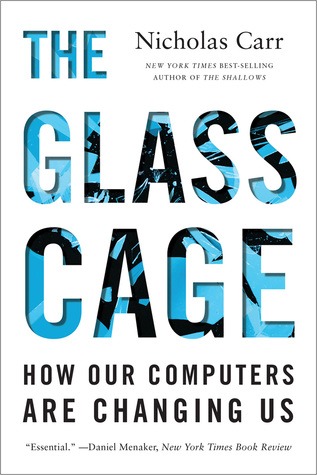The Glass Cage Summary
3 min read ⌚
 How Our Computers Are Changing Us
How Our Computers Are Changing Us
Undoubtedly, you use computers on a daily basis. Frighteningly, you are not aware of the many ways they have altered your very biology. Nicholas G. Carr is here to explain that to you in his “elegant” bestseller “The Glass Cage.”
About Nicholas Carr
 Nicholas Carr is a renowned American writer on business and technological topics. He first came to the world’s attention with an often debated 2008 “Atlantic” article titled “Is Google Making Us Stupid?” He further devised the ideas expounded in the article in his 2010 book, “The Shallows” which was a finalist for the 2011 Pulitzer General Nonfiction Prize.
Nicholas Carr is a renowned American writer on business and technological topics. He first came to the world’s attention with an often debated 2008 “Atlantic” article titled “Is Google Making Us Stupid?” He further devised the ideas expounded in the article in his 2010 book, “The Shallows” which was a finalist for the 2011 Pulitzer General Nonfiction Prize.
Carr has written two more books since then, one of which is “The Glass Cage,” and the other ”Utopia Is Creepy.”
“The Glass Cage Summary”
The main idea behind “The Glass Cage,” Nicholas Carr’s “essential” book on the effect of automation on human cognition is very simple: the smarter the machines are, the dumber and more isolated the humans will become.
That’s, in fact, the main metaphor contained within the very title. “As we begin to live our lives inside glass cockpits,” he writes, “we seem fated to discover what pilots already know: a glass cockpit can also be a glass cage.”
Unfortunately, this is not merely a metaphor.
In 2009, two airplanes – an upstate New York Continental Connection flight and an Air France flight from Brazil to Paris – were the victims of the effects of this technological glass cage.
Namely, unexpected changes in the airplanes’ autopilot systems caused them to react in an extremely poor way, which turned out to be the cause of the accident in both cases.
However, Nicholas Carr warns that we can go deeper and say that the cause is the autopilot itself. Or, better yet, the effects it has on humans.
Now, Carr is a serious author and, no matter what critics claim, he is certainly not a Luddite. In fact, he shows over and over again how much we’ve profited from the technological progress. In fact, automated cars, he says, are much safer then human-driven cars and, in the future, they may be able to save many lives.
However, the Luddites – who back in the 19th century destroyed textile machines blaming them for unemployment – seemed to have been right about the effect automation has on human redundancy. In fact, even John Maynard Keynes warned against “technological unemployment.”
Not necessarily a bad thing if you take into consideration people like Oscar Wilde or Karl Marx. They believed that machines – and, in the case of the latter, measures such as universal basic income – will free people to do creative and intellectual endeavors.
However, a bad thing even in that case – if you merely sit back and start enjoying the ride. Because, by the time that happens, you’re bound to become too lazy and dumb to even want to do anything.
You know, the kind of dystopia “Idiocracy” or “Wall-E” warn against.
Key Lessons from “The Glass Cage”
1. Automation Has Its Good Sides…
2. …And Its Best Sides
3. Beware of the Latter to Reap the Rewards
Automation Has Its Good Sides…
Automation has contributed to affluence and happiness in ways previous generations couldn’t have even imagined. In addition, it has made our lives much safer: automated cars are all but 100% safe, so they are very close to making human drivers an obsolete category.
…And Its Best Sides
That may be the biggest problem of automation. Not “technological unemployment” per se, but the fact that people are more and more reliant on automated tasks. So, they forget how to do them in absence of some help.
This has caused few airplane disasters. It seems that once the autopilot started malfunctioning, pilots didn’t know how to react. Or, better yet – they knew once, but they had forgotten.
Beware of the Latter to Reap the Rewards
So, that’s the main lesson of this book: automation is inherently neither good nor bad if you don’t put yourself into the equation.
Or, in other words, you must think of computers as tools, much in the same manner you think of, say, fire. An Arab proverb says that you can use fire to cook some food on it, or to burn your tent. The same is true for computers.
So, don’t burn your tent – learn how to do everything else with them.
Like this summary? We’d Like to invite you to download our free 12 min app, for more amazing summaries and audiobooks.
“The Glass Cage” Quotes
Automation and its predecessor, mechanization, have been marching forward for centuries, and by and large our circumstances have improved greatly as a result. Click To Tweet Automation can take a toll on our work, our talents and our lives. It can narrow our perspectives and limit our choices. Click To Tweet In the worst cases, people become so trusting of technology that their awareness of what’s going on around them fades completely. They tune out. Click To Tweet The vast server farms operated by companies like Google, Amazon and Apple essentially run themselves. Click To Tweet For all their gifts, computers still display a frightening lack of common sense. Click To Tweet
Emir is the Head of Marketing at 12min. In his spare time, he loves to meditate and play soccer.


 How Our Computers Are Changing Us
How Our Computers Are Changing Us



